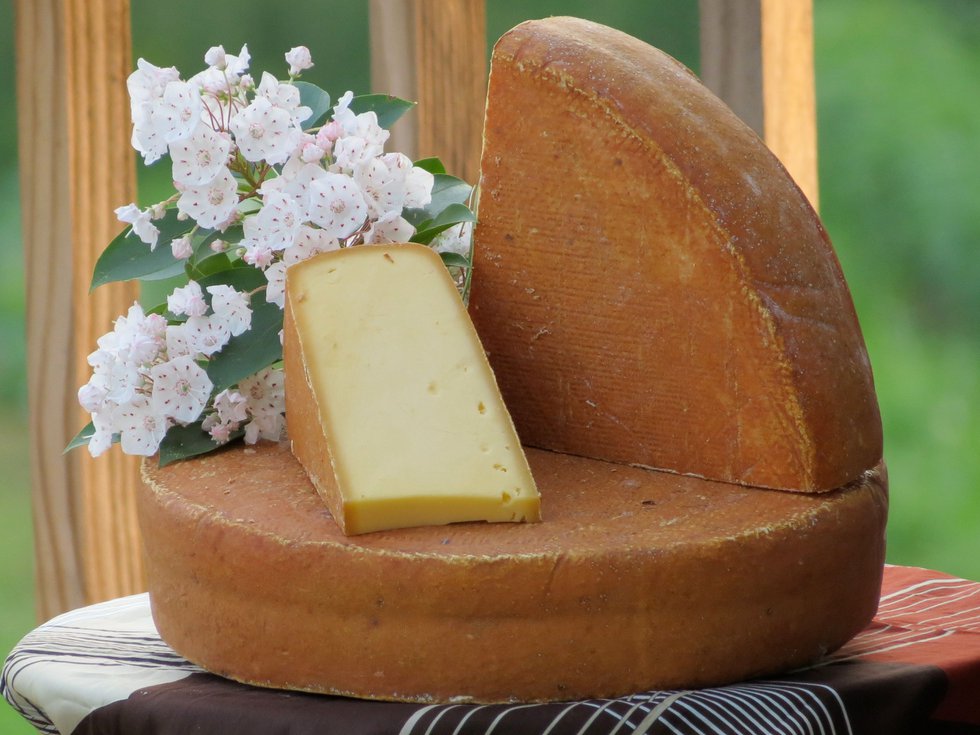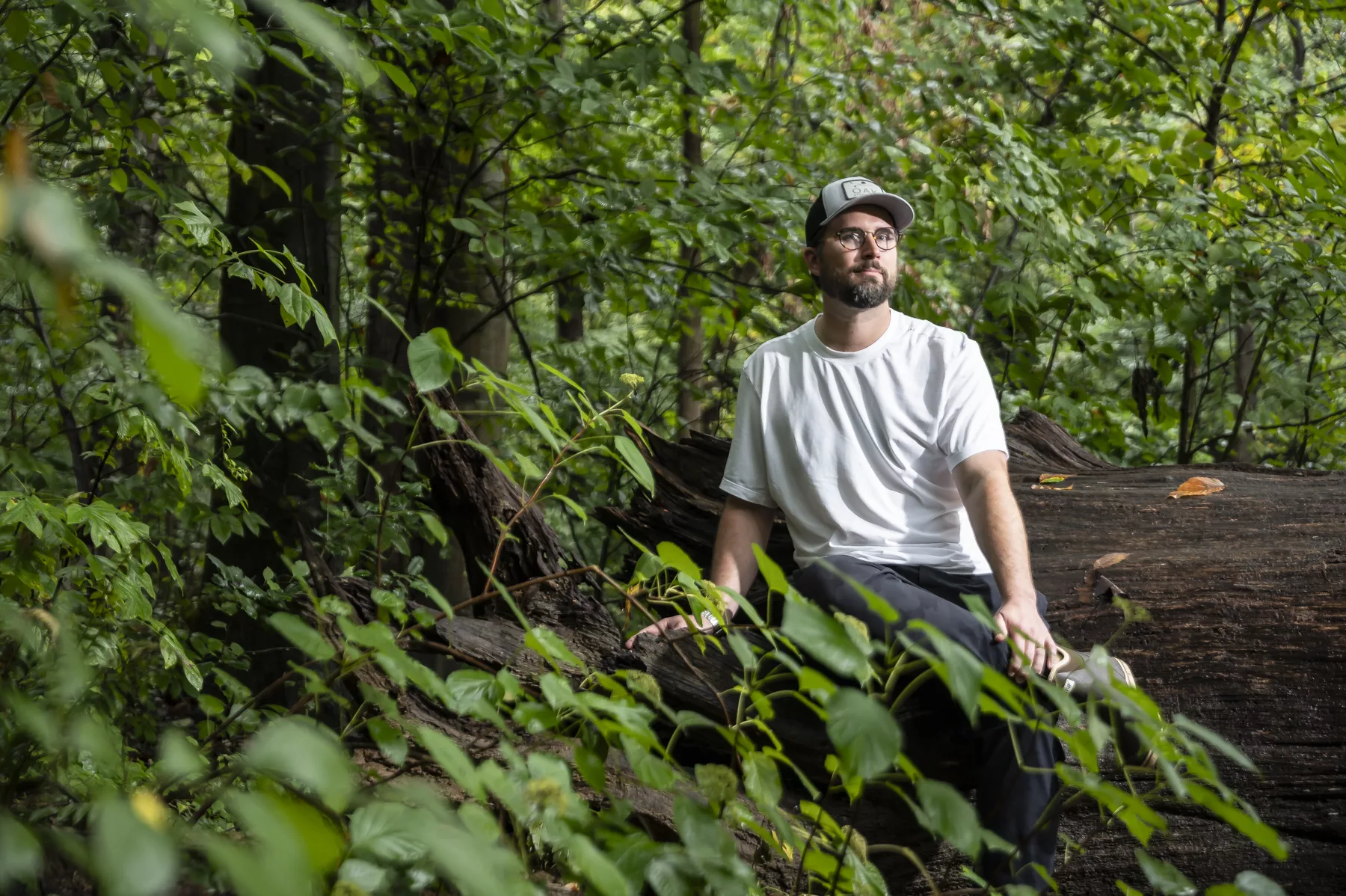Their lives up-ended, a New Jersey couple came to Virginia by way of the Outer Banks and fell into farming.

meal brenda paul
Right, Brenda and Paul Lawler

Faith Farm meal
Slow-roasted pork with fennel, apples and red cabbage; apples with cranberries and honey; roast chicken.

A tractor; Tristan collects eggs.

Faith Farm’s chickens, when they’re not inside their moveable “chicken mobiles,” enjoy scratching around in the sunshine. Occasionally, the farmer has to protect them from a predator.

Photographic proof that 2-year-olds can enjoy cucumber with garlic-and-chive goat cheese; milchbrot fresh from the oven, with pork shoulder in the background.

The Lawlers grew shiitake mushrooms on log stacks tucked back in the woods.

Baked squash and roasted chicken

Creamed Brussels sprouts, green beans with shiitake mushrooms and almonds, sweet potatoes.

Faith Farm meal
Slow-roasted pork with fennel, apples and red cabbage; apples with cranberries and honey; roast chicken.

Sausage and pecan cornbread muffins and milchbrot (milk bread); apples with cranberries and honey.

Jessica, Paul and Brenda’s daughter, with son Tristan; sunset.

The spread.
On the side of a winding country road in Green Bay stands a big rollaway sign that reads, “I CAN DO ALL THINGS THROUGH CHRIST WHO STRENGTHENS ME.” Anyone curious as to how that might work should hang a left into the driveway there. Pay a visit to Faith Farm, purveyor of grass-fed beef, free-range chicken and eggs, pastured pork, shiitake mushrooms and honey, established by Paul and Brenda Lawler in 2005.
The story of Faith Farm actually begins a few years before that.
In her farmhouse kitchen, Brenda Lawler, her lively face framed with curly, dark hair, stands at her photo-covered refrigerator and points to an image of three pretty girls, her daughters. “This is Shana, Erin and Jess,” she says. “We moved to the Outer Banks in ’98, and in ’99, Shana was killed by a drunk driver.”
It made the national news and Court TV: Four high school friends from New Jersey rode a bus 12 hours to spend spring break with Shana in Colington Harbor, arriving on Easter night. On Tuesday afternoon, a daytime drinker ran a light and T-boned the Chevy Cavalier carrying the five teens. Megan Blong, Amanda Geiger and Angela McGrady died instantly. Mike Horner suffered serious injuries but survived. Shana lingered in a coma for seven days.
The driver is in prison for a minimum of 60 years. The Lawlers’ eldest, Erin, now 30, works full time as a substance abuse counselor in a New Jersey high school. Jessica, 27, lives near her parents with her husband and 2-year-old son and helps on the farm.
And the parents? “You really can’t live through something like this unless—thank God—you have a good marriage, and you can sustain it,” Brenda says. Then she smiles brightly and adds, “And then you give up your life and be a farmer!”
Of course, it wasn’t that simple. “Our real idea to move out here was not to farm—at all,” she says. “At all.”
After the accident, while the Lawlers managed their various business ventures, including a personal chef business started in 2003, they also began to develop a vision of a Christian camp for teenagers, and they started looking at land in Virginia. In 2004, they found the 95 rolling acres in Green Bay, near Farmville.
But issues of liability and greater-than-anticipated complexity rendered the camp idea untenable, and the Lawlers went back home, ready to set it aside. Then, Brenda recalls, a friend said, “‘Where’s your faith, Paul?’ Hence, ‘Faith Farm.’”
The next question was how to make a living while making their vision real, she says: “We’re not farmers—all we grow is weeds.” A visit to the Virginia Cooperative Extension office led them to a class called “So You Have a Small Farm: What Do You Do Now?”
They spent the next year educating themselves, finally selling their Outer Banks house and moving to Green Bay in August 2005. “From 2004 to 2005, we just went to class, talked to farmers, learned from people,” Brenda explains. “We knew this was a lifetime of learning, but we went to the people who were doing it right, so we took a shortcut … the fast track.” She had begun to learn about the slow foods movement through the chef business, which led to the couple’s commitment to sustainability, raising healthy, wholesome products and selling them locally. A primary mentor has been lecturer and author Joel Salatin (Salad Bar Beef, Everything I Want to Do Is Illegal and other books), of Swoope, who once described himself in Mother Jones magazine as a “Christian-libertarian-environmentalist-lunatic farmer.”
Open since August 2006, Faith Farm does a brisk business through farmers’ markets in Richmond and Lynchburg, winter deliveries and on-site sales (by appointment only). Demand often exceeds supply. Even so—and as maxed out as the Lawlers are—they dream of cooking classes, forays into dairy, the camp for kids and an on-site store in an old school house, selling other farmers’ produce as well. Next spring, asparagus joins the Lawlers’ list of offerings.
“I can’t believe how far we’ve come,” Brenda says of the farm’s (exhausting) success, “and I know it has a lot to do not only with our faith in God, but us as a couple working together. There’s no way that you could do this and be successful unless you’re of one mind and know what you’re doing and can work together.”
She and Paul met at age 15 in Bayonne, New Jersey, where they’d grown up 12 blocks from each other, and married at 23. “I knew what I was getting,” Brenda laughs. “I trained him up in the right way.”
Paul Lawler is the cool breeze to Brenda’s firecracker Jersey girl, a tall, sturdy, quiet man with bright blue eyes. They split duties, with Brenda packing, weighing and basically providing the face of the business while Paul handles the hard labor and the more earthy aspects of processing meat. “I’m the hypocrite of the family,” says Brenda. “There are things that I can do, and there are things that give me nightmares.”
Paul says, “I’ve got to kill a hog once in a while, chickens, cows. … You look at them, you really feel bad, but we pray over the animals when they take them, first for their anxiety to be removed, lessened if anything.” His voice is low and even, and it’s easy to imagine just the sound of it bringing comfort. “We try to ensure that they’ll be humanely killed.”
Daughter Jessica, a brown-eyed echo of her father, has taken on the chicken end of the business. It’s no small feat to feed them, manage the “chicken mobiles” (portable shelters that have to be moved every day), collect eggs and take care of the “peeps” in the “oven,” a shedlike structure that holds 300 chicks at 90 degrees. “It’s taken so much pressure off Paul,” says Brenda, adding, “Of all my children, Jessica would be the one I’d say never would do this.” But Jessica wanted to raise her son, Tristan, around what her parents are creating in the farm. “The kid’s first two words together were, ‘Get pig.’”
By the pasture where one-third of their 98-cow herd graze—the rest are in space leased at two other farms—Brenda gushes over the cows. “They’re so cute.” Up in the woods, near where shiitake mushrooms grow on lengths of white pine stacked like Lincoln Logs, an explosion of leaves yields a hog, startled from the bed he’s made against a Confederate gravestone leaning alone among the trees. He runs off to join a pair of scraggly sheep (fence jumpers from a neighboring farm) and a goat belonging to the Lawlers.
Two weeks before, when the pig escaped from the eight-acre enclosure he shared with the couple’s 40 or so other hogs, “Paul decided to let him run [free],” says Brenda, “to see how he makes out without eating grain … which costs a fortune.” The renegade hog looks no worse for wear and isn’t looking to come back, which bodes well for the experiment—some people are allergic to corn and grain, so totally pasture-fed pork brings a pretty penny. And it makes for a quirky pack.
A stroll around the property traces an edge between laughter and tears. Near the chicken mobiles lie two dead pullets, victims of a fox most likely. Out in the middle of another field is a solitary jawbone that looks like a dog’s. “Oh, I wonder if it’s Gus,” says Brenda, her voice catching.
The daily dance between life and death, past and future, grows increasingly bittersweet as the holidays approach. Thanksgiving should be relatively easy for the Lawlers, what with the bounty all around them. In fact, the farm’s offerings inspire the feast we’ve created here.
But Christmas is another matter. “We were always huge on Christmas, and Shana would be our Christmas girl,” says Brenda. “We haven’t had a Christmas since. Can’t do it.” But there are new considerations now, she realizes. “I think, for this year, I’ll try, for the little boy. … Jessie asked me, ‘Can we please have Christmas this year?’”
A visit to the end of Faith Farm’s driveway should help.
The Recipes
No-rules sweet potatoes, green beans with shiitake mushrooms and almonds, baked squash, milchbrot (milk bread), slow-roasted pork with fennel, apples and red cabbage, roast chicken, apples with cranberries and honey, sausage and pecan shortcut muffins
NO-RULES SWEET POTATOES
4 pounds sweet potatoes in various colors (check Oriental markets)
olive oil
Wash sweet potatoes, and coat with olive oil. Roast until tender, 45 minutes to an hour depending on size. Peel when cool enough to handle. Puree—or slice. Season to taste with the traditional butter, brown sugar, cinnamon and-or nutmeg, or with honey, maple syrup, orange juice, chipotle, ginger or cinnamon—or not at all.
GREEN BEANS WITH SHIITAKE MUSHROOMS AND ALMONDS
1 pound green beans
3 tablespoons butter
1 onion, chopped
1/2 pound shiitake mushrooms, sliced
1 cup slivered almonds
salt
pepper
Blanch the beans until bright green, drain, and immediately immerse in an ice bath. Drain again, and dry. In a small, dry skillet, toast almonds until golden, and set aside. Heat the butter in a large skillet, and sautée the onion until tender. Add mushrooms, and sautée for 3–5 minutes. Add beans, and toss until heated through. Salt and pepper to taste. Add almonds as a garnish.
BAKED SQUASH
3 pounds acorn and/or butternut squash
olive oil
salt
pepper
Preheat the oven to 350. Wash and dry the squashes, and lightly coat with olive oil. Season with salt and pepper. Bake for approximately 45 minutes or until fork-tender. To serve, peel, cut into pieces and arrange on a platter. Drizzle with honey or maple syrup, if desired.
CREAMED BRUSSELS SPROUTS
3 – 4 pounds Brussels sprouts
1 onion, chopped
3 tablespoons butter
2 tablespoons olive oil
1 1⁄2 cups heavy cream
1 1⁄2 cups chicken or vegetable stock
salt
pepper
nutmeg, fresh-grated
Peel the sprouts, score the root ends, and blanch until bright green, taking care not to crowd the pot. In a large skillet, sauté the onion in the butter and olive oil, until tender. Cut the Brussels sprouts in half, and add them to the onion mix, mixing until the sprouts are coated. Add the stock, salt and pepper, and simmer until tender. Cool slightly, then puree in batches. Return the mixture to the pan, add cream and correct seasoning with salt, pepper and nutmeg, and simmer until desired thickness.
MILCHBROT (milk bread)
1 1⁄2 tablespoons yeast
3 1⁄4 cups warm milk
1 large egg
2⁄3 cup + 1 tablespoon sugar
1⁄2 tablespoon salt
1⁄2 tablespoon vanilla extract
1⁄2 tablespoon lemon zest
61⁄4 cups cake flour
61⁄4 cups all-purpose flour
1⁄2 cup raisins
1 egg, beaten
Mix yeast, 1 cup of the milk and 2⁄3 cup sugar, and let stand 20 minutes. Combine egg, remaining sugar, salt, vanilla, lemon zest and flour. Mix with remaining milk, adding more if needed. Add raisins. Let rise until double, beat down, and rise again. Braid. Brush with beaten eggs. Bake in a preheated 325-degree oven for 30 minutes. Makes two loaves.
SLOW-ROASTED PORK WITH FENNEL, APPLES AND RED CABBAGE
Pork
1 bone-in-shoulder or Boston butt pork roast, 6–8 pounds
1 tablespoon granulated garlic
3 tablespoons salt
2 tablespoons peppercorns
2 tablespoons fennel seed
3 tablespoons caraway seed
1 tablespoon celery seed
1 tablespoon thyme
1 teaspoon anise
11⁄2 tablespoons fresh rosemary, chopped
2 tablespoons coriander
1 tablespoon mustard seed
Two days before meal: Grind all spices coarsely, and combine. Score the fat on the meat, and cover with the rub, rubbing in. Leave overnight in the refrigerator. Half an hour before cooking, remove from refrigerator and let rest at room temperature. Then roast in a 200-degree oven until meat thermometer reads 170–180 degrees, several hours.
Fennel, apples and red cabbage
Note: This part can be made the day before the meal or the morning of, which allows flavors to mingle.
2 tablespoons canola oil
1⁄2 red onion, julienned
1 a head red cabbage, julienned
1 bulb fennel, julienned
3 golden delicious apples, peeled, cored and sliced
1 tablespoon coriander seeds
1 teaspoon peppercorns
1 stick cinnamon
1⁄2 teaspoon whole allspice
5 whole cloves
1 tablespoon salt
3 tablespoons sugar
1 cup water
1 cup chicken stock
Crush all the whole spices, and tie them into a piece of cheesecloth. In a large oven-proof pot with a lid, heat oil and sautée the onion and fennel until tender. Add cabbage, and cook for 5 minutes or so. Add apples, seasoning packet and liquids. Bake in oven at 350 for one hour.
Slice pork, and serve on top of the fennel-apple-cabbage mixture.
ROAST CHICKEN
1 whole chicken, 2 1⁄2–3 pounds
salt
pepper
Allow chicken to rest at room temperature for 30 minutes or so. Preheat the oven to 400 degrees. Rinse and dry the chicken, then salt and pepper it inside and out—and don’t be timid with the seasoning. Roast on a vertical roaster for 45 minutes to an hour, or until a meat thermometer inserted into the thigh reads 190 degrees.
APPLES WITH CRANBERRIES AND HONEY
8 apples—gala, Braeburn or golden delicious
2 cups dried cranberries
honey
1 stick cinnamon
1 cup apple cider or apple juice
Preheat the oven to 350. Top and scoop out the insides of apples, and place them in a 13×9-inch pan. Fill each with cranberries, and drizzle with a tablespoon of honey. Replace apple tops. Break cinnamon stick into the pan, and pour the apple cider or juice around the apples. Cover pan with aluminum foil, and bake for 35–45 minutes.
SAUSAGE AND PECAN SHORTCUT MUFFINS
1 package high-quality cornbread mix
1⁄2 cup pecans, chopped
4 breakfast sausage links, cooked and crumbled or chopped
In a dry skillet over medium heat, toast pecans until golden. Fry sausage, and chop when slightly cooled. Prepare mix according to instructions, fold in sausage and pecans, and pour into a greased muffin tin. Bake according to mix instructions.








